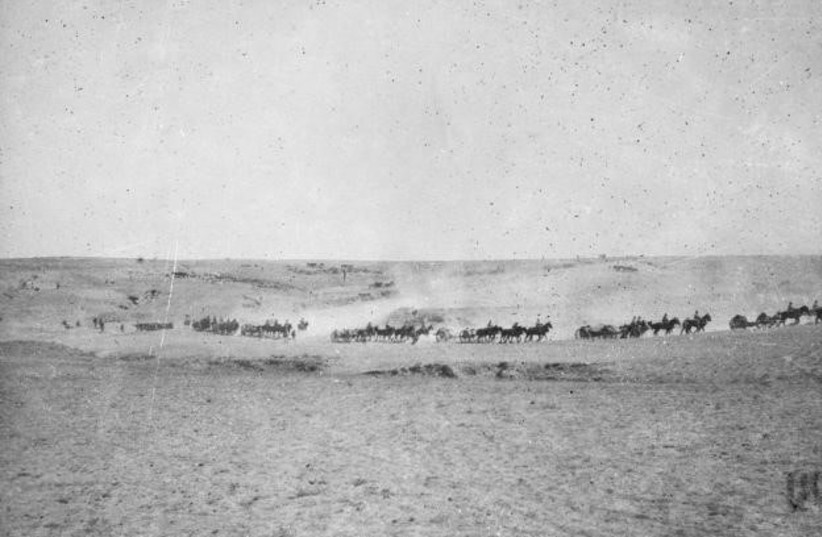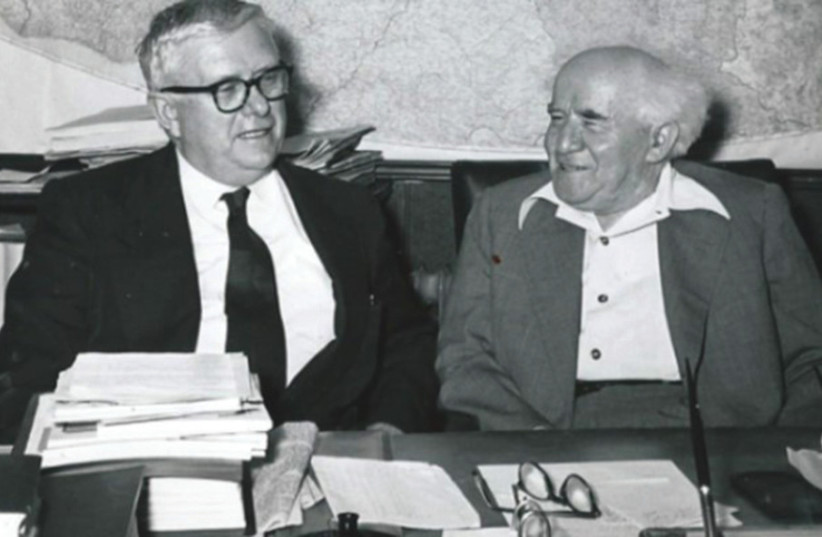As we look toward celebrating 75 years of the reborn modern State of Israel, we note that next year will mark 75 years of the strong diplomatic relationship between Israel and Australia.
The basis of the relationship goes back considerably farther than 1949. It is remembered every year in Beersheba, where the Australian ambassador hosts a gathering to recall the Battle of Beersheba, which took place on October 31, 1917. The brave young men of the 4th Australian Light Horse Cavalry Brigade, using their bayonets as swords, managed to overcome the well-armed Turks against all odds. The winning of the battle paved the way for the liberation of Palestine and the fall of the Ottoman Empire. It is no coincidence that on November 2, two days later, Britain’s foreign minister, Arthur James Balfour, wrote his famous letter to Lord Rothschild, head of Britain’s Jewish community, committing the British government to creating a homeland for the Jewish people in Palestine.
The Magazine met with recently appointed Australian Ambassador Dr. Ralph King. A warm, soft-spoken individual, King is a senior career officer in the Department of Foreign Affairs and Trade. He is married to Jenny Cartmill – Australia’s high commissioner to Malta – who is looking forward to joining her husband on completion of her posting. Fortunately, with a flight time of less than three hours between Israel and Malta, the couple is able to meet up with little difficulty.
King graciously agreed to be interviewed as below.
What was the catalyst for your accepting the post of Australia’s ambassador to Israel?
I had for some time hoped to have the chance to serve as ambassador to Israel but had never expected to be able to do so; I was usually in the middle of another posting when this job became vacant.

But when my immediate predecessor left Israel late last year, I was accompanying my wife on her own posting and therefore in a position to apply. As good fortune would have it, my application was successful. It’s all very serendipitous, and I feel lucky.
You presented your credentials to President Isaac Herzog in January, some two months following Israel’s fifth election in under four years. Your predecessor ambassador Paul Griffiths arrived here in the midst of the COVID pandemic, while you have arrived in the midst of a country divided on the proposed judicial reforms.
How is Australia reacting to Israel’s proposal for judicial reform?
Australia has been one of Israel’s strongest supporters for almost 75 years. There is genuine depth to our relationship, built on people-to-people ties and a shared commitment to liberal democracy, which necessarily includes freedom of speech, valuing human rights and commitment to the rule of law.
We know that the proposed judicial reforms are a sensitive matter for many Israelis, and that this is a debate to be had by Israel’s own citizens and system. It is our hope, as a long-standing friend of Israel’s, that if changes are made, they be made in a deliberative and inclusive manner.
Your background and knowledge of the Middle East is most impressive – a BA degree in Arabic and Middle East studies, followed by an MPhil and a PhD in international relations. You have served as head of mission in three Arab countries – Saudi Arabia, Egypt and Kuwait. Your fluency in Arabic must have given you an additional insight into the thinking, not only of the leadership of these respective countries but also the man in the street’s attitude toward Israel.
How does the average citizen in these countries view Israel?
I’d make two observations here. First, I left my last Middle East post in 2018, well before the signing of the Abraham Accords, and Kuwait as long ago as 2007; there have been some significant, and positive, changes since then.
Second, it is, as you’d understand, very difficult to generalize about public attitudes toward Israel. The absence of official ties made (and can still make) people in Arab countries reluctant to speak about the topic. There is, in general, a low level of public awareness of Israeli society and politics (as opposed to the Israeli-Palestinian dispute). And there is often a gap between what governments say publicly about Israel and what they believe (and do) in private.
You served as ambassador to Saudi Arabia (2015-2018), with nonresident accreditation to Bahrain, Oman and Yemen. Bahrain is now part of the Abraham Accords.
There is much talk and hope that Saudi Arabia might be the next country to join the Abraham Accords. Do you believe this is a possibility in the near future?
Australia is a strong supporter of the Abraham Accords, the normalization of Israel’s place in the Middle East, and the widening of peace in this region. So we would welcome further such peace agreements.
Saudi Arabia will make peace with Israel when it is in its best interests to do so. I have no special insight on its assessments.
You have served, for a number of years, within Australia’s Department of Foreign Affairs and Trade. In 2019-2020, Israel was Australia’s 45th-largest two-way trading partner and 50th-largest export market, amounting to approximately $1.3 billion.
What is the update on these figures? How do you see the future economic and trade agreements evolving, and in which direction specifically?
The trade relationship between Australia and Israel has grown in recent years, but there’s a lot of untapped potential. Recent figures suggest that, notwithstanding the growth of two-way trade to AUD1.4 billion in 2021-22, Israel is Australia’s 48th-largest trading partner.
Investment flows are more encouraging, as demonstrated by a 26% increase in Israeli investment in Australia in the last five years, and a 32% increase in Australian investment in Israel from 2020 to 2021. The total value of investments between Australia and Israel in 2021 was some AUD3 billion. Israel is the third-largest source of foreign company listings on the Australian Stock Exchange (ASX) (19), behind only the US and New Zealand. Market capitalization of Israeli companies on the ASX is approximately AUD2 billion.
The Australian Trade and Defense Office and our respective chambers of commerce are helping to drive investment and diversification in both economies. They facilitate investment by Israeli tech companies into Australia and assist Australian exporters to diversify their trade. We hope direct flights between Australia and Israel will further boost two-way business and investment in the future.

This month marks four years since Australia and Israel signed the first-ever tax treaty between the countries to eliminate double taxation with respect to taxes on income and the prevention of tax evasion and avoidance.
Is there a possibility of a free trade agreement between Australia and Israel in the near future?
We completed a free trade agreement feasibility study in February 2021. Ministers held exploratory discussions in October 2021, and officials in January 2022. Australia will continue to engage with Israel to determine the next steps to building our trade and investment relationship.
Australia stands out as one of a few countries supporting Israel at the United Nations General Assembly. It is also one of seven countries supporting Israel at the UN Human Rights Council.
Why does Australia support Israel at these forums?
Our approach to this question is and has long been clear: We will not support the unfair and disproportionate targeting of Israel in international forums.
This does not prevent us from expressing our differences of opinion on certain policy questions in votes on specific resolutions.
Israel has enjoyed 74 years of strong, positive diplomatic relations with Australia – a reality that is much appreciated.
Recently, Australia withdrew its recognition of west Jerusalem as being part of Israel. Is this indicative of a change in policy toward Israel?
Australia will always be a steadfast friend of Israel. We were among the first countries to formally recognize Israel, under Labor prime minister Ben Chifley. The Australian government will not waver in its support of Israel and the Jewish community in Australia. Nor will it stand by while Israel is singled out for unfair attention in international forums.
The reaffirmation in November 2022 of Australia’s previous and long-standing position on Jerusalem – that Jerusalem is a final-status issue that should be resolved as part of any peace negotiations between Israel and the Palestinian people – in no way changes our fundamental approach to Israel.
We remain committed to a two-state solution in which Israel and a future Palestinian state coexist, in peace and security, within internationally recognized borders.
What do you hope to achieve during your term of office as Australia’s ambassador to Israel?
I’m fortunate to have inherited a relationship that is as strong in practical terms as it is warm and respectful, and to have great partners to work with. I give full credit to the continuing efforts of the Jewish community in Australia, and to our energetic chambers of commerce. I look forward to working with them – particularly as we approach the 75th anniversary of diplomatic relations next year.
I’ve already alluded to my belief that a lot more could be done in the area of trade. I’d like to pursue opportunities for growth in areas like advanced technology – including agricultural, defense and space technology – agribusiness, renewable energy and the health sector.
Australia is a great place to visit. It’s friendly, affordable, and it has spectacular scenery. Israelis can already travel via the Gulf; with any luck, they may before too long be able to fly to Australia directly.
I’d also like to see much greater awareness – and more Israelis taking advantage – of Australia’s outstanding tertiary education sector. The standard of the research done by our universities helps explain their impressive performance in all international tertiary rankings.
BACK TO the beginning; Israel’s Independence Day is always preceded by Remembrance Day, which this year will take place on the Gregorian date of April 25. It is a day when the country recalls those who gave their lives to secure the continuity of the one Jewish state.
April 25 is the day, every year, when Australia and New Zealand commemorate ANZAC Day (ANZAC is the acronym for the Australia and New Zealand Army Corps), mourning those who gave their lives in battle in 1915, in the midst of WW I, and in subsequent conflicts.
The Australian Imperial Force – which included a number of Jewish officers and soldiers who later became part of the British Army’s Jewish Legion – together with the New Zealand soldiers, landed in Gallipoli; the aim was to capture the peninsula. However, faced with fierce resistance by the Ottoman Army, the bold action of ANZAC planned to eliminate the Ottomans dragged on for eight months, resulting in the deaths of 8,709 Australians and 2,721 New Zealanders.
Ceremonies take place throughout Australia and New Zealand, while in Israel a ceremony is held at the Jerusalem War Memorial on Mount Scopus.
As Israel’s Independence Day approaches, we recall the catalytic part played by Australia in the 1947 United Nations Partition Plan. Dr. H.V. Evatt, Australia’s minister for external affairs (later to preside over the General Assembly from 1948 to 1949), was a strong supporter of the Zionist movement. Evatt chaired the Ad Hoc Committee on the Palestinian Question, leading the negotiations that resulted in the passing of the Partition Plan. Evatt regarded the establishment of Israel as a great victory for the UN.
Thank you, Ambassador King and, through you, Australia, for your historic support of Israel, which continues to this day. ■
The writer is chairperson of Israel, Britain and the Commonwealth Association, which aims to strengthen the bridges between Israel, Britain and the Commonwealth countries.
